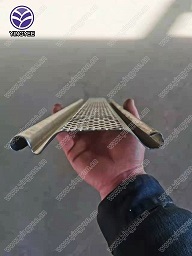
Understanding the Drywall Forming Machine An Essential Tool in Construction
In the construction industry, efficiency and quality are paramount. One of the key components that contribute to both is the drywall forming machine. This innovative equipment has revolutionized the way drywall is manufactured and installed, helping contractors to meet the increasing demand for fast and reliable building materials.
What is a Drywall Forming Machine?
A drywall forming machine is specialized equipment designed to produce gypsum board or drywall sheets. These machines automate the process of mixing, forming, and cutting the gypsum into standardized sizes. The primary components of a drywall forming machine include a mixer, a forming table, a drying system, and a cutting mechanism. With these integrated functions, the machine not only enhances productivity but also ensures consistency in the quality of the drywall produced.
Benefits of Using a Drywall Forming Machine
1. Increased Efficiency One of the most significant advantages of using a drywall forming machine is the speed at which it operates. Traditional methods of drywall manufacturing require significant manual labor and time. In contrast, drywall forming machines can produce large quantities of sheets quickly, allowing contractors to complete projects ahead of schedule.
2. Cost-Effectiveness The automation provided by a drywall forming machine reduces labor costs significantly. By minimizing the number of workers needed in the production process, construction companies can redirect their resources to other areas, ultimately saving on overall project costs. Additionally, the precision of these machines helps eliminate waste material, further contributing to cost efficiency.

3. High Quality and Consistency The precision engineering of drywall forming machines ensures that every sheet produced meets strict quality standards. This consistency is crucial in construction, where even minor discrepancies can lead to significant problems during installation. By producing uniform sheets, contractors can ensure that their work is of the highest quality.
4. Environmental Considerations Many modern drywall forming machines are designed with sustainability in mind. They often use recycled materials and minimize waste during production. Moreover, by streamlining the manufacturing process, these machines contribute to a lower carbon footprint, making them a more environmentally friendly option.
Types of Drywall Forming Machines
There are several types of drywall forming machines available on the market, each tailored to meet different production needs. Some are designed for small-scale operations, while others can handle high-capacity production lines. Common types include
- Continuous Forming Machines These machines allow for the uninterrupted production of drywall sheets, making them ideal for large-scale manufacturing facilities. - Batch Forming Machines Used for smaller productions, batch machines are versatile and can produce various sizes and thicknesses of drywall. - Specialized Machines Some drywall forming machines are designed to produce specialty boards, such as moisture-resistant or fire-rated drywall.
Conclusion
In conclusion, the drywall forming machine stands out as a critical innovation in the construction sector. By enhancing efficiency, reducing costs, ensuring quality, and supporting sustainable practices, these machines represent a significant advancement in building material production. As the construction industry continues to evolve, the drywall forming machine will play an increasingly vital role in shaping the future of how we build structures. For contractors and builders looking to optimize their operations, investing in a drywall forming machine could be the key to success in an ever-competitive market.